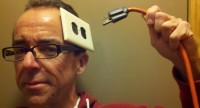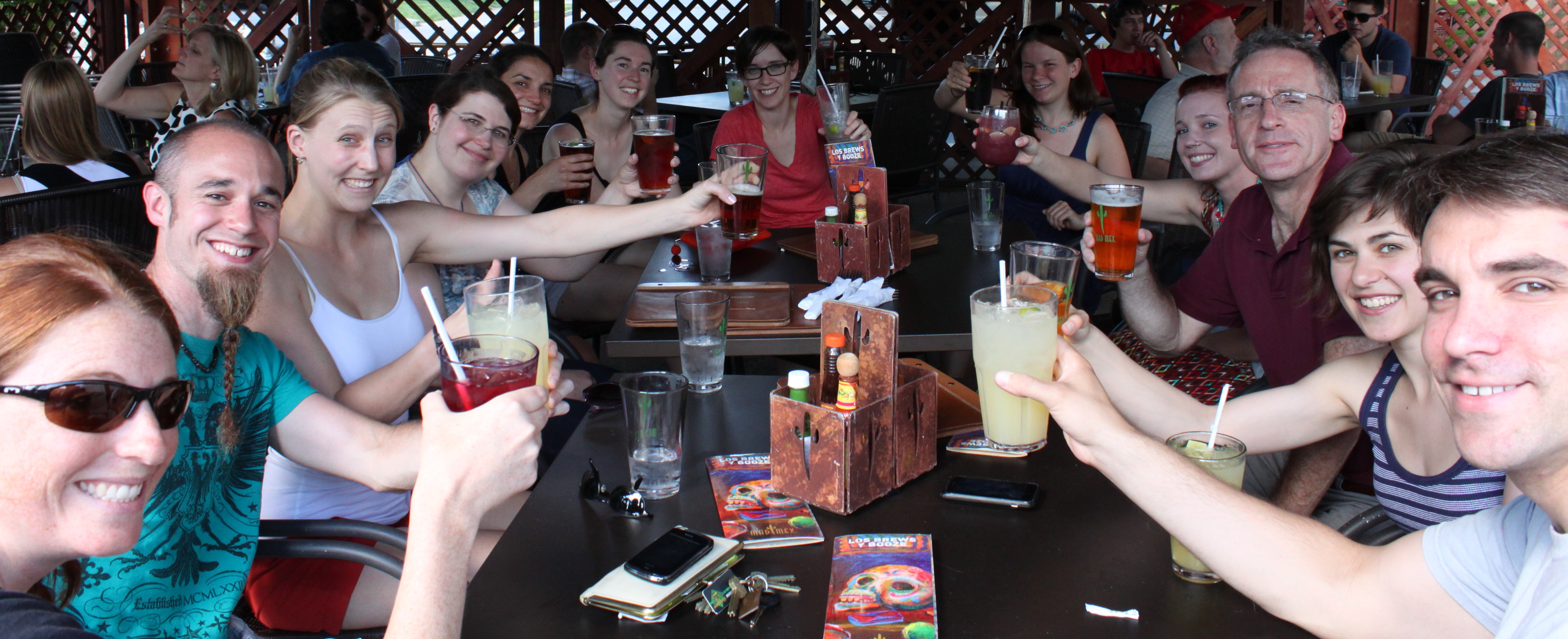…for Silvie!
Monthly Archives: May 2013
Garfield
Many people enjoy the ‘Garfield’ comic strip; a comic about a lazy, sarcastic cat who loves lasagna and hates Mondays. What’s not to like? As Nina pointed out in a previous blog post, there aren’t that many truly new ideas left to have, but thank goodness Dan Walsh didn’t know that, or else he might not have ever asked himself, “What would ‘Garfield’ be like without Garfield?” And with that simple question ‘Garfield-minus-Garfield’ was born.
The premise of ‘Garfield-minus-Garfield’ is straight-forward; remove Garfield and all references to him from an original ‘Garfield’ comic and see what happens. With Garfield removed, the reader can focus more intently on Garfield’s owner Jon, who, as it turns out, is the more compelling character in the strip. As an example, here’s the original strip.
In the above strip, the joke is that Garfield is lazy. But when Garfield is removed, the whole perspective changes. Instead, the strip becomes a view into Jon’s state of depression.
I’m also a big fan of another ‘Garfield’ spinoff called ‘Realfield’ (http://juannavarro.wordpress.com/2007/12/21/realfield-like-lasagna-too/). In this comic, Garfield is replaced with a real cat. Different, but also funny.
TL;DR
It has been pointed out that we should be following the journalistic exhortation to simplify, to reduce, to “kill ones darlings” when compiling our manuscripts. We must shape the message, spin the content to its best effect and grab the editor and referees attention in the first 300, 200, 100 words, in the first paragraph, in the title.
Undoubtedly this is good advice. We should be clear and concise. But it does make one wonder where such brevity, in a kind of reductio ad absurdum way, might lead.
To a recently discovered new journal dedicated to publishing via Twitter perhaps. As one might expect manuscripts submitted to JTwitBiol have to conform to the 140 character limit as do each of the referee’s and editor’s comments and decisions. As a test case a revamped biopesticide paper was duly submitted:
Fngs klls mlria. Intr: Malria bd Fngs Gd. M&M: An st, Bb, Spry, xp. Rslts: Dth&Dstrctn P<0.001. Dsc: Prblm slvd Nbl Prz pls. Refs: Thng1, Thng2
Appropriately enough the comments from the referees came back quickly.
Rfree1: OMG IMHO ths m/s Totes Amaze. Hv no rsrvtns abt nythng, gr8 cncpt, wll dsgnd, wll wrttn, shld b pblshd.
Rfree2: AYFKMWTS? So bd I SCOON. IRL thr NFW ths wrks. Evn smpl BOTEC FUBAR. WOMT. TGIF.
Rfree3: TL;DR
The editor sealed the manuscripts fate.
Edtr: Thx 4 sbmtng wrk 2 JTwitBiol. Nftntly & dspte Ref3 mssng pnt, cnt rcncle hge dfrncs btwn rfees so mst REJECT m/s.
Absurd decision of course. Editor must be suffering fro Boanthropy. So it goes.
Part 2. Or: Forest Ecology?
Even though I (like many others) often feel like I don’t know anything or have any skills, I am probably more frustrated by feeling that I don’t know anything important (i.e., at this point, relevant to my thesis). I do actually know a fair number of facts, though; I have always been apt to acquire them.
This is one reason why I always liked science classes. I loved memorizing things: kingdom, phylum, class, order, family, genus, species (I memorized that in sixth grade. Before “domain” was a thing.). But, even if everyone is a little crazy, not everyone is a little lyrebird, happy to chirp back new words.
I know that learning things by rote works. We chanted the cell theory together as a biology class in ninth grade, and I can still intone, “All cells come from preexisting cells.” But science has so much more than trivia to give to people who don’t want to be scientists. I worry that it’s more the way we teach science…and math, and most everything else for that matter, rather than individual variation in curiosity and voracity for understanding, which leads children to dislike school and, especially, science. Do you think that’s true?
As I said before, I need people to explain things to me. Especially as a child, I had trouble seeing the forest for the trees. I am totally into trees, but it was still really annoying to finally turn around and realize how much sense they can all make together. I guess what I’m advocating here is, instead of… tree taxonomy(?), forest ecology?
Picking your fights
This feels a little like jumping on the bandwagon but the stress meeting got me thinking. More specifically it got me over-thinking, about science, life, happiness, where to go next, whether it will be possible…
I would generally agree with Nicole and Silvie that the meeting is useful – its good to know that I am not the only one to sometimes feel inadequate and Matts comment about judging productivity on the timescale of years not weeks certainly made me feel better about my current slump. However, I would argue that the issues brought up fall into two distinct piles. Some like wanting to know more about the safety of the chemicals being used in the lab or needing more practice with talks, emails etc. to overcome nerves are clear solvable problems and as such are useful to be aired. Others are things that sadly I think we are always going to be stuck with. I can look at Nicole* and say it is totally crazy she ever feels dumb but she won’t believe it anymore than I do when she says it to me. As William Falk says “we are all, to some extent, crazy” this is not going to change and maybe spending too much time categorising what form of crazy we are is just picking at the wound. Personally I am becoming an advocate of fixing the things you can and then slamming the door on the basement and going to the pub.
* only singled out due to being my main sounding board when I am ignoring my own advice.
Curators: The Most Organized Hoarders
I spent this Memorial Day Weekend in Philadelphia, and besides copious amounts of wine and good company, my favorite part was visiting the Mutter Museum, operated by the College of Physicians of Philadelphia. On par with the International Museum of Surgical Science in Chicago, it contains a beautiful collection of anatomical specimens, medical oddities, and obsolete surgical instruments of the most heinous variety. One of the most impressive exhibits was the skull collection of Dr. Joseph Hyrtl, an anatomist and phrenologist from Vienna. This collection was amassed over his career and contains 139 specimens, including data such as age, gender and cause of death (here’s the whole catalog; you can even adopt one!)
I overheard a lot of comments while perusing the Hyrtl collection, most notably “why would anyone collect skulls, that is so creepy”. While I have to admit that keeping a basement full of body parts sounds more serial killer than it does pioneer scientist, the habit of collecting specimens (of all kinds) that was popularized among both career scientists and hobbyists alike in the Victorian era has greatly benefited the public today. I had the privilege to receive an educational grant in college to work as a curation assistant at the Illinois State Museum Research and Collections Center in the Zoology department. This is a 97,000 square foot warehouse facility where all of the accessions are housed, most of them still waiting on identification and cataloging, which was my primary task during my time there. Admittedly, some of the accessions were clearly piles of junk that someone had collected that were donated after their passing, including jars of formaldehyde-preserved stomach contents from…some type of mammal? But we never, ever threw anything away; we don’t know what could possibly be useful later on, down to the smallest bone fragments. It was interesting to identify, fix and catalog everything from dragonfly specimens from eminent entomologists, to trophies donated by Teddy Roosevelt, to a collection of 5,000 mammal skins and skulls preserved by a hobbyist.
Every once in a while, curation enters the back of my mind as a possible job prospect, despite the fact that funding and opportunities are even more scarce than those in research science. Despite curation being more or less an attempt at organizing what we already know, the preservation and care of the past is invaluable to the future of the field of science in general.

Nut jobs?
 We did a lab meeting on stress a few weeks back (1, 2). It’ll be a couple of years before we do another. Meanwhile, the American Psychiatric Association has released the 5th edition of its DSM, the Diagnostic and Statistical Manual of Mental Disorders. It looks to me like folks trying to write a manual of infectious diseases before germ theory.
We did a lab meeting on stress a few weeks back (1, 2). It’ll be a couple of years before we do another. Meanwhile, the American Psychiatric Association has released the 5th edition of its DSM, the Diagnostic and Statistical Manual of Mental Disorders. It looks to me like folks trying to write a manual of infectious diseases before germ theory.
I really admire powerful and succinct writing. We get The Week. The editorials are <300 words long, and they usually knock my socks off with their pointed brevity. Try this opener by William Falk, prompted by the release of DSM-5:
We are all, to some extent, crazy. If you come to know any human being well enough, you eventually gain access to the basement where the traumas and wounds and deprivations are stored; rummage in there for a while, and you begin to understand the neuroses and fixations that shape his or her personality. The successful, reasonably happy people I’ve known are nuts in a way that works for them. Those who struggle and suffer fail to turn their preoccupations to some meaningful use….
Getting Squirrely
We are frequently captivated by the accumulation of large numbers of individuals of a single (or multiple) species. Mass gatherings can be triggered by seasonal migrations, such as those exhibited by monarch butterflies, red crabs of Christmas Island in Southeast Asia or of dragonfly species that have been suggested to fly the utterly absurd distance from southern India to eastern Africa, managing a pit stop in the Maldive Islands. Other sources of impressive animal aggregations are a result of reproductive or intellectual coordination. The eruption of cicadas from their sleepy below-ground dwellings and the gathering of ruffians interested in the ecology and evolutionary biology of disease this past week, serve as two local examples of the mentioned phenomena.
Tightly packed individuals whether in swarms, herds or schools capture our imagination in a way that is absent when rarity, instead of abundance is the default condition, especially with regard to “uncharismatic” animals such as insects (entomologists feel free to argue away). Generally, we also tend to pay less attention to animals that we observe frequently on a day-to-day basis. Aggregations of these animals often force us to pay greater attention to them.
Which leads me to squirrel migrations.
I recently learned that squirrel migrations (better described as sporadic mass movements, as they appear to have no discernible spatial or temporal pattern) have been a documented phenomenon, being described by early naturalists mostly during the late 18th and early 19th centuries. There are accounts of gray squirrels moving in great numbers through open grasslands, 4-5 miles from any forest, and even awkwardly swimming sometimes to fatal exhaustion in the Hudson, Ohio and Niagara rivers. Numbers were sufficient enough during these events that a single hunter was recognized of killing 160 animals in one day. Calculations based on historical accounts put the number of squirrels at 30,000 in a square mile. Why were they on the move? The dominant explanation seems to be one centered on over-population. Regardless, I’ll be looking at the furry critters on campus with less of a perfunctory gaze.
One thing at a time…
I listened to a really interesting podcast yesterday while at the microscope quantifying parasitemia. It was a discussion about multitasking, which is exactly what I was doing as the counter went clickety-click for each cell. Apparently when college students at Stanford use media they are using on average four different forms of media at a time: a sampling of twitter, facebook, email, music, texting, television, etc, while working on writing a paper for a class. Teenage girls were also surveyed and clocked in using a surprising three concurrent forms of media on average.
There is the misconception that multi-tasking lets you get a lot more done in less time compared to doing things in sequence. Chronic multitaskers are the most willing to believe that this is true. According to the guest (and recent author of this book) the perceived gains from multitasking are a complete and total myth. Across the board, everyone is actually much worse at getting anything done when stretching their brain between several different topics. Even worse news, chronic multitasking causes deficiency when only trying to complete one task!
On this note, I’m going to make more of an effort to focus on only one thing at a time, at least media-wise, and try to follow that one thing through before starting the next.
Pipe dreams
I saw a preview for a new movie coming out, which seems to take place in a future where the ultra-privileged who live in space while the desperately poor fight for scraps on the Earth below. I’m a sucker for sci-fi, but the part that grabbed my attention was a scene in which a young woman from the privileged set enters a device not unlike a tanning bed to get a health check-up. The tanning bed informs her that she has trace amounts of cancer cells and then–in less time than it takes to start up a computer–that it has eliminated all of the offending cells. The woman then exits the tanning bed to do whatever the space-elite do to fill the time when they’re not actively oppressing the poor.
It would be great to eliminate the cancer cells while leaving the surrounding tissue intact, but the part of the technology I really want to see is the detection device. For starters, no magic bullet can be effective if we don’t know that we need to use it. But also all therapies that act against living things are a double-edged sword, meaning that they select for the traits we fear most (cells that are more drug-resistant, more aggressively cancerous) even as they reduce the chances for our targets to replicate and mutate into their nightmarish-counterparts.
I’m skeptical of the tanning bed though. Unless treatment is truly free of side-effects, I don’t see how any strategy can be effective if we don’t understand how big the problem is and how fast it is spreading. In other words, the cancer detector should require at least two time points of data to make a good estimate of risk and determine the optimal degree of treatment. Intervention is costly both in monetary terms and in the potential for collateral damage, and those costs must be weighed against the risks associated with doing nothing.
Decompressing
I believe that to be better at your job, that is to be a more efficient worker and to continue to love what your doing while your doing it, you need to build in some time to decompress and unplug from the daily stressors of our jobs. I feel this is especially true for scientists in academia with flex schedules, which contrary to popular belief does not mean we can take as many vacations as we want when we want, but instead means we tend to work all of the time. I often try to build in time off to do something I enjoy outside of work after a series of deadlines have been met or after a particularly busy point in work. It serves as a reward for accomplishing said tasks and allows the brain to recover for the time when I return to work. So, to practice what I preach, I am off to our Northern neighbor Canada for a long weekend to visit friends and to frankly, not think about work, as much as I love it. Happy Memorial weekend !
!
Stress, revisited…again
I wonder if it’s a coincidence that the week when we have our “stress” lab meeting, I have one of my most stressed out days ever. I think it must be, because — according to my response to Lauren’s post — the stress lab meeting didn’t itself stress me out. Rather, it’s probably the inordinate number of deadlines facing me as well as ridiculous obstacles to actually meeting them. I won’t bore you with the details, because my perceived busyness isn’t the point.

Is that my esophagus in your hand? May I have it back please?
I think an interesting follow up to the question of “what stresses you out?” is “what does your stress feel like?”. For me, it feels like someone has grabbed my esophagus and is twisting it with two hands in opposite directions. It’s a horrible sort of I can’t breathe / I might vomit combo feeling. Blech. Not pleasant.
My approaches for dealing with this esophagus-squashing stress have included:
1. ujjayi breathing…a relic from my more active yoga days. I have had limited success with this today.
2. ice cream…a relic from (I don’t know) childhood (?). This was delicious and did temporarily relieve some stress, but the effects wore off once I had scraped the last bit out of the bowl.
3. giving one of my best buddies a giant hug after not seeing her for 7 months. I haven’t actually done this one yet, since her train has yet to arrive. And, naturally, her train is late (but I’m trying to not let that stress me out!). I have a good feeling about this approach though.
If anyone has any other stress-relieving suggestions, I’d be up for hearing them because today’s most promising approach is, sadly, a bit hard to engineer.
Why are you into science?
There are probably two types of scientists: the ones who want to solve intellectually interesting problems, and the ones who are driven to safe the world. Of course, in an ideal world, we would kill these two birds with one stone, but deep down, what is mainly driving you?
The reason why I ask is that I find the science of malaria eradication – applied science at the heart – fascinating. ISglobal, the institute I am now associated with, is increasingly focusing on malaria eradication. Academically, this involves a whole shift in mindset: the goal is not output in terms of papers, it is eradication success. I had the privilege to attend a few sessions in the science of eradication course held in Barcelona, a very interesting experience. Although I am skeptic when it comes to eradication, it is an intriguing process. There are many unknowns and I believe eradication is potentially risky, but nevertheless, attempts for eradication will happen, with or without answers. In fact, some of these questions can only be answered by doing the large-scale ‘experiment’.
And as such, while the aim of eradication is not to generate data, it will do so. This is the reason why I am so intrigued by the whole process: it is a large-scale evolutionary experiment. Is my interest based on a drive to safe the world? Perhaps the honest answer to this questions would be no, I think there are more efficient ways to safe the world. However, I do hope that as an academic I will generate data and knowledge that would help the process and I believe it is my duty as an academic to strive for this knowledge to be put in the right hands and minds, so that they can, eventually, safe the world.
Stress
We periodically have “pub sessions” in place of lab meetings. Your initial inclination, as mine was, may be to assume the pub is short for publication. This is not the case. A pub session derives its name from the meeting location: the pub. During these informal gatherings, Matt and Andrew lead an informal discussion on a general topic. This sort of thing has the potential to be completely obnoxious, but actually this is an enjoyable and often helpful experience. However, there is one pub session that I dread and that is the yearly “stress meeting”.
The intention of this meeting is to allow lab members to describe what causes them stress. The desired outcome is that by airing these concerns and addressing them that we will be liberated from them. Additionally, we will be comforted in the knowledge that others share similar concerns. Freed from the bonds of anxiety we will burst forth to become unstoppable research machines leaving mounds of Nature and Science papers in our wake.
For those of us that struggle with stress, this scenario is not probable.
First, for those of us who are expert worriers these situations do nothing but increase anxiety. As Jessi described in an earlier post, worriers practice worrying and are very good at it. As other members describe their concerns the well-worn networks of anxiety synapses will begin to fire in many of the listener’s brains. Their heart rate increases and muscles will tense as their bodies become anxious and primed to feel worried. Second, as that fight or flight response kicks in the higher processing centers of the brain turn off. We are left only with the primitive parts of our brain function. These primitive components of the brain are the ones that we share with reptiles. Not too many reptilian paper authors are there?
I think the key flaw in the current model for this meeting is that we are trying to stop stress. Stress is a physiological response to external stimuli. It is the reason your ancient ancestors survived and the reason you are here. Even though you are no longer scraping in the caves to survive, your ancient stress response remains. It has been heavily selected for and it will always be with you. We should all feel remarkably blessed that we have supervisors who want to know what they can do to improve our stress. This will not happen in the real world so feel lucky. Instead of trying to stop stress, I believe we will be better served by working to understand it, recognize it, and manage it, in the same way that a diabetic knows to monitor and adjust their insulin levels. (Yes, body I know you are responding as though we have just seen a zombie bear, but really the PCR just didn’t work. So calm down).
So, what do I suggest instead? I think we should follow the advice of Shawn Achor’s recent TED talk. Achor does this so beautifully I’m not inclined to attempt to paraphrase. If I had to come up with one suggestion to take from this excellent talk (this is well worth the 12 minute watch) it would be that we turn this “Stress” meeting into a “Wellness” meeting. We should take a time out to talk about one thing that we absolutely love about working as a scientist and then turn to our neighbor and tell them why we are grateful to have them as a colleague, and yes, we can also have a
few pints.
Metablogging
Based on a recommendation from Andrew, I recently read Quiet: The Power of Introverts in a World That Can’t Stop Talking. There are some useful parts of the books where I learned new things, for example a section on how introverts and extroverts can communicate effectively and a section describing a longitudinal study of introverted and extroverted babies.*
There are also portions of the book that weren’t particularly surprising to me. For example, the author details how many of the early developers of personal computers and the internet were introverts and, when it comes to communicating with a lot of people at once, introverts tend to prefer online options like listservs and blogs.
Coincidentally, at the same time that I was reading Quiet, I read this PLoS Biology perspective on cultivating an online presences via social media. As an introvert with a highly searchable name, I’m predisposed to agree with many of the points made in the piece. What I found interesting about that piece was that, while social media like Facebook and blogs have been around longer than many of the papers I cite in my latest manuscript, the idea of scientists using this media is novel enough to merit space in PLoS Bio.**
Which raises the question, why aren’t most scientists already using these tools? Or are they and PLoS Bio is behind the times? Is there a natural predisposition to adopting new media? Are the scientists who are already using this media making the conscious decision to improve their visibility, or are they doing it because they find it cool? The authors of the piece suggest that people feel overwhelmed by the online options; others might argue that it’s a generational gap, but this hasn’t been my experience. What say you, fellow Read/Thomas lab members, are bloggers made or born?
* Which I immediately used to diagnose all the babies I know as introverts or extroverts. Most of them are extroverts.
** The PLoS journals generally seem on the leading edge for this sort of thing. On a tangential note, I recently submitted manuscript revisions and there was the option to submit a Tweetable (i.e. 120 character) summary of your paper, which I thought was kind of cool and shows how journals are getting in on the social media action too.
The State of Higher Education in the US: Service with a Smile?
I’m sitting here writing this in the small town of Delaware, Ohio, where I’ll be seeing my sister graduate from college this weekend. On the 6 hour drive here, I thought a lot about college, and the state of the university system in America. And then I started thinking about the flashback-trippy scenes in Pink Floyd’s “The Wall” as the students matriculate into the meat grinder….clearly, the system’s broken. I have no concrete answers on how to fix the problem, but with mounting unemployment rate and nearly unbearable student loan repayments for recent grads, there has to be something here that’s just not working.
According to a recent survey of 4900 recent US grads published by McKinsey and Company, 2/3 of students state that “college didn’t prepare me well for my job” and state that perhaps incorporating more “life skills” into coursework would have been useful, and they seemed more dissatisfied with their lack of training in “life skills” than other skills such as quantitative reasoning, analytical writing, etc. All buzzwords aside, I’m still confused; having T.A.’d in undergrad and graduate school, the life skills that these students aren’t putting into good practice are things like motivation, time management, responsibility and a sense of interest in education. I’m starting to feel as if the students see college as a pure business transaction, and that higher education in this country has become a customer service industry, and that they’re here to get a “good degree” that will get them a “good job” that will lead them to a “good career”, and if you can’t get them that piece of paper, it’s clearly YOUR fault. You must not be a good instructor/TA. You aren’t sensitive enough to their needs, and don’t offer extra credit when a student has slacked off all semester and realizes they need to pass.
The sentiment has become all too often “YOU didn’t GIVE me an A.” instead of “I didn’t earn an A in this class, I should take more responsibility for my own education”. For a country in which we have pretty free access to information via the internet, libraries, and other resources, the motivation to take learning into one’s own hands is pretty pathetic. My generation seems to have to be spoon-fed exactly what they “need” to know in order to regurgitate the information on a piece of paper only to forget about it later. I’m aware that many of these students feel strongly against incorporating the “general education” curriculum into their time here, and that is surely a source of their lack of motivation. But even then, in the coursework required for their degrees, college students of my generation take little responsibility for their own education when it turns out the way they don’t want. The survey above states that 53% of the recent grads surveyed regret their choice of major and/or university. But the main conclusion is that the university system is responsible for changing this sentiment, and should do more to placate the needs of its customers.
This piece was a bit more of a rant than I had intended; and I’m sure you all have opinions on this issue, and where the solution lies for fixing a broken system. Yet, if I continue into academia, I’d rather not be viewed as a sales associate with a PhD that’s selling a product. In reality, there is a product, and there is capital, but, I still don’t buy the “I’m paying X amount of money, so I should get EXACTLY WHAT I WANT” argument, unless there’s some effort on the other side too.
Part 1 of 2
I should start by saying that I don’t really believe in reincarnation.
(Well, I should probably start by apologizing to Andrew, who probably was expecting other kinds of topics on the blog. Don’t worry- part 2 will be more related to science.)
I think that I first heard about reincarnation at a pretty young age, when my grandmother mentioned that she felt like she had done such-and-such in her past life. I was probably freaked out by this possibility then. Souls, spirits, ghosts, magic, and aliens were basically equivalent and equivalently confusing to me as a child and, while my default stance towards natural things was to be curious, my default when it came to supernatural things was to be afraid. This fear of the supernatural I blame on the neighbors who tried to save me by taking me to church, without having had anyone explain to me that there is some debate about whether or not Hell is actually a place.
I spent a lot of time being afraid as a kid because people didn’t sufficiently explain things to me. In the absence of explanations, I wasn’t always even able to characterize things correctly as natural vs. supernatural. When I realized this later, I used to think about whether rain would have terrified me if I grew up in, say, the Atacama, and then moved somewhere else. (Most likely yes.)
Also later, once I figured out that eclipses had nothing to do with aliens and I wouldn’t go to Hell for wondering if aliens existed, I also got to thinking about reincarnation. And I came to the conclusion that, if it did exist, then I must be a newbie. Reincarnation is where, I reasoned, people’s intuition came from: you learned these things in your previous life. Since I usually feel like I don’t know anything and that the thing that I use to make decisions besides logic (which is what I would describe as intuition) is so often wrong, this must be my first time around the block.
Back to the future
It’s hard to imagine life without internet, without computers, televisions, radios, cars, engines, light bulbs, electricity, the scientific method. Luckily, we have those things, and so I don’t have to.
But what if I were sent back in time, one (or a few) thousand years? How hard would it be to build a computer? For me, impossible. I’ve spent 80% of my life in school, nearly half of those years were focused specifically on science. How can I not know how to build a computer (arguably the most important invention of the last century) from a pile of sand and a block of iron?
There is a substantial difference between knowing how something works and knowing how to make something work. Which makes me wonder, if I did go back in time, what would I be able to do? I could tell people to do things – wash your hands, heat your milk, test your hypotheses – but I probably couldn’t communicate why without being committed.
I think it would be really cool if there were a science course built around the advancement of scientific knowledge over the past 2000 years. Starting at the beginning, and showing the interplay between advancements in different scientific disciplines through lectures and labs. That way, if I were sent back in time, I would be able to build a computer from scratch. But maybe that’s what History of Science courses already are.
Moving by the numbers
Since I spent four days of this week on the road, rather than in the lab, I thought I’d share some data I collected along the way.
We traveled for roughly 2,050 miles. The first hypothesis we tested was that cats that have never ridden in the car before will adjust. Our cat took about 4 hours to resign himself to the fate of being trapped in a car, followed by a one hour adjustment period at the beginning of each new day on the road (this means approximately 7 of 34 hours, or 20% of the trip was accompanied by a soundtrack of meowing. The ratio could have been much worse).

Stars of roadside attractions are often larger than life. There was the world’s largest prairie dog, a cow with an extra leg, (we didn’t stop for these), and what was probably one of the largest crosses in the country which dwarfed the trees and made quite the impression even at 80mph.
The largest wind chimes are 49 feet tall and exist in Kansas. This prompted us to test a second hypothesis: that it is windy enough in Kansas that having two bikes strapped to the back of a Civic decreases fuel efficiency by about 10 mpg. Our alternative hypothesis was that the air pressure in the tires had fallen, which we ruled out at the next gas stop (a pressure gage is $1.69 in Nowhere, KS). The fact that our mpg went back to normal after Missouri where there were some hills to break up the wind supported hypothesis #1.
Average gas prices ranged from $3.19 to $3.69 per gallon along route 70. On a side note, I feel this must have been too cheap because there were certainly a lot of cars on the road that had only one occupant, and rarely did we see buses. There was one cyclist chugging along in eastern Colorado with some huge saddlebags, and three hitchhikers along the highway, but I’m not sure we can assume these alternative modes of transportation were due to the price of gas. We kept track of license plates we saw from other states while on the road, documenting 41/50 states. The majority of those missed were from New England, which could be expected since we were heading East and only went as far as the middle of PA. It’s good to be back.
Making use of our human bias
The name Dd2 may not mean much to you, but to me it is the Mary Poppins of malaria strains. Dd2 is multi-drug resistant, and research shows it grows faster than many other strains because it invades red blood cells better and makes more offspring per red blood cell–it’s practically perfect in every way.
I worry about sharing that with people, because it is strong evidence that I anthropomorphize the organisms I study, but after reading this article, I suspect that attaching images and impressions to words is a fundamental part of human language processing. The mental images we attach to words and phrases are suggestive of the way we think about the world. For example, when someone says they had a rough day, apparently many of us go to a sandpaper place in our minds. But what I find encouraging about all of this is that we each bring a different set of biases to the table. For the phrase “flying pig” some of us think of a pig with wings but others imagine a Superman-like pig flying through the air. Scientists worry about a lot about systematic biases–like basing our knowledge of the brain on right-handed people only–but if this article is right, many of our more subtle biases might not be systematic. Since all of us carry different biases, then if we got enough people from different backgrounds and cultures together, we could make use of our unsystematic biases to do better science. Perhaps it’s not a problem that I think of Dd2 as Mary Poppins, so long as other people favor a different metaphor.






